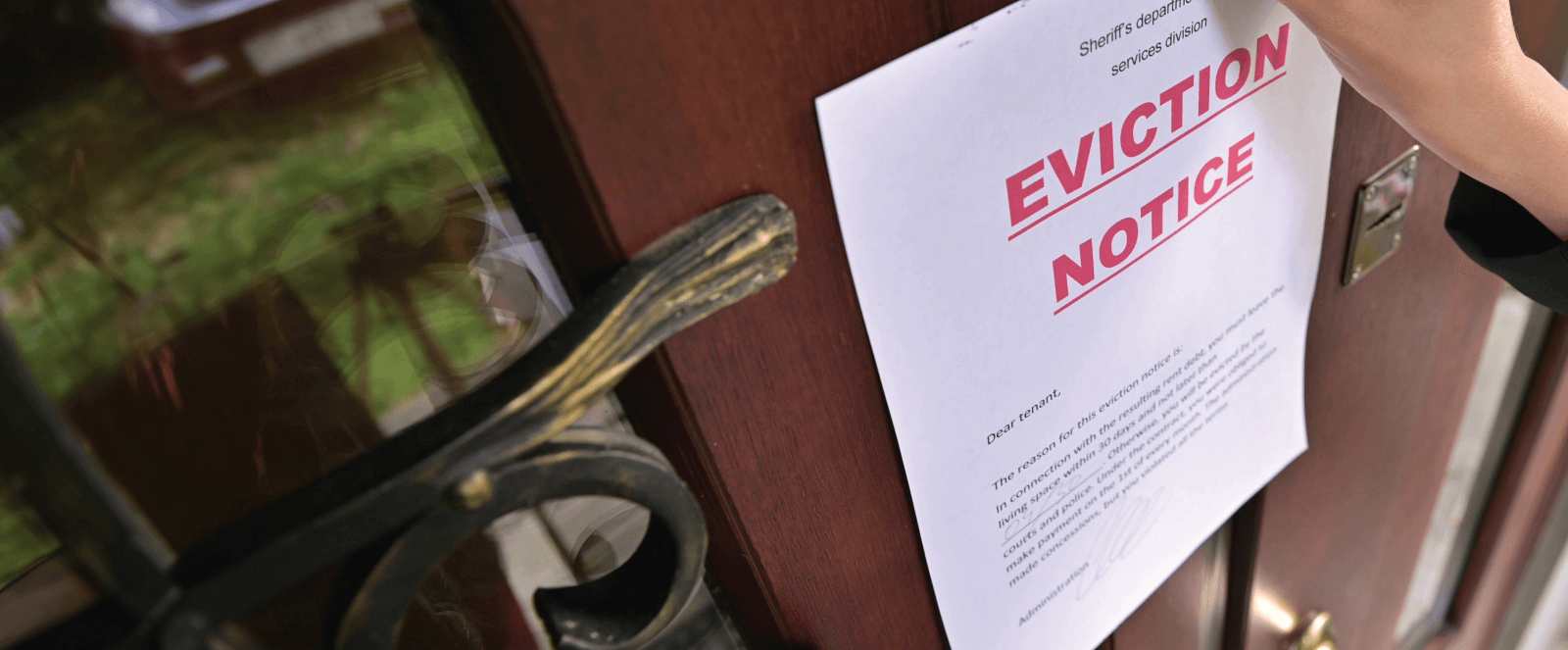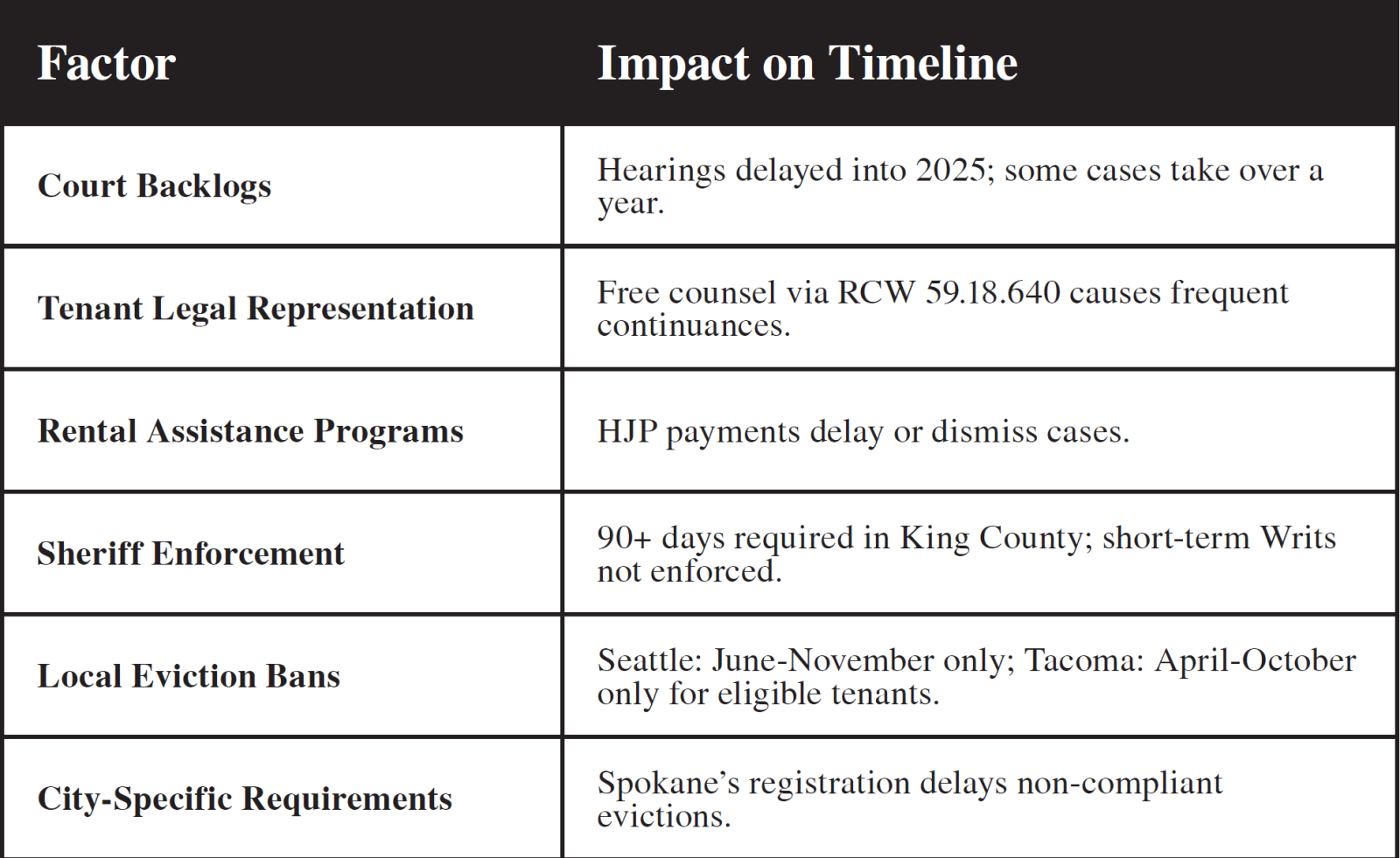Understanding the Eviction Process in Washington State: Focus on King County

Evictions are among the most complex and sensitive aspects of property management, requiring rental housing providers to navigate a multifaceted legal landscape shaped by state and local regulations. In King County, the eviction process—known as an "unlawful detainer action"—is mostly governed by the Revised Code of Washington (RCW) 59.12, 59.18, 59.20, with Seattle and other cities like Tacoma and Spokane imposing additional restrictions. This article outlines the eviction process, integrating new requirements under House Bill (HB) 1003, Washington’s right-to-counsel law, King County Sheriff’s Office procedures, and a notable outlier case to highlight systemic challenges. Given court-specific variations, extended timelines, and tenant protections, RHAWA’s revised forms, educational classes, and vendor attorneys are critical for reclaiming property as efficiently as possible, though even flawless execution does not guarantee a swift resolution.
STATEWIDE EVICTION FRAMEWORK
The eviction process in Washington follows a structured sequence, but rental regulations, local ordinances, and procedural variations often extend timelines beyond government estimates of 1–3 months.
1. Serve a Legally Valid Notice to Vacate
Providers or their representatives must issue a written notice specifying the eviction reason and compliance timeline:
- Non-Payment of Rent: 14-Day Notice to Pay or Vacate (or 30 days for property benefiting from Federal funds and subject to the CAREs Act).
- Lease Violations: 10-Day Notice to Comply (curable violations, e.g., unauthorized vehicles) or 3-Day Notice to Quit (non-curable violations, e.g., criminal activity).
- No-Cause (e.g., end of term): 60-Day Notice for term tenancies.
- With Cause (e.g., end of tenancy): From 20-day up to 120-day notice based on selected cause.
2. Per HB 1003 (effective July 27, 2025), notices must include the specific date on which the tenant must vacate or, if applicable, comply. While RHAWA has revised all Pay or Vacate and Comply or Vacate notices, instructions, and Declarations of Service to meet these requirements, we recommend you consult with your attorney before serving these notices. The following is a summary of the legal service process you must follow:
- Personal Service: Always first attempt to hand a copy to each adult occupant by knocking/ringing on the door of the residence.
- Substituted Service: Leave copies with a person of suitable age, plus mail via USPS Certified Mail (First Class Mail required until July 27, 2025) to each occupant and “All Other Occupants” (until July 27, 2025, must be mailed from within the property’s county).
- Posting and Mailing: If no one is available, post conspicuously and mail as above.
- On the same day of service, complete and retain the Declaration of Service for court evidence.
3. File an Unlawful Detainer in Superior Court
If the tenant does not comply, the provider’s attorney will file a complaint in the appropriate Superior Court. An accurate Declaration of Service is essential to avoid dismissal.
4. Serve Court Documents
Documents must be served at least 2 court days before the hearing by a sheriff, licensed process server, or uninvolved adult over 18. Improper service results in case dismissal.
5. Attend the Court Hearing
Both parties present their case. Under RCW 59.18.640, tenants have a right to court-appointed counsel, often through programs like the Housing Justice Project (HJP) in King County, leading to frequent continuances and delays due to attorney availability.
6. Obtain a Writ of Restitution
If successful, the court issues a Writ of Restitution, authorizing sheriff enforcement after 3 judicial days (excluding service day, weekends, holidays).
7. Sheriff Enforcement Procedures (King County)
If tenants remain, providers contact the assigned officer to schedule eviction.
- Occupancy Check: After the effective date, verify vacancy, avoiding checks if tenants are dangerous.
- Scheduling: Evictions are first-call, first-scheduled, prioritizing safety. Tenants must not know the date, or rescheduling may occur.
- Eviction Day: Detectives supervise for ~1 hour. Providers must:
- Supply labor and equipment (e.g., trash bags, boxes).
- Sign Page 3 of the Eviction Data Form at the time of eviction.
- Remove tenant property from the public right-of-way within 24 hours to avoid fines.
- Hazardous items (e.g., drugs, weapons) are handled by law enforcement or secured by tenants if legal.
LOCAL EVICTION RESTRICTIONS
Washington cities impose unique regulations that further complicate the eviction process:
Seattle
- Winter Eviction Ban (Ordinance 126041): December 1 to February 28, protecting low/moderate-income tenants, except for criminal activity, owner move-in (90 days’ notice), or condemned units.
- School Year Eviction Ban (Ordinance 126369): September to mid-June, protecting households with school-aged children or school employees, with similar exceptions.
- Due to these restrictions, most physical evictions in Seattle occur between late June and November.
Tacoma (Landlord Fairness Code Initiative (LFCI), Effective December 8, 2023):
- Protects tenants in school or working at schools from evictions that will take place during the school year (mid-June to the beginning of September).
- Protects tenants from being evicted between November 1 and April 1.
Spokane, Tacoma, Seattle:
- Providers must register and license their rental units with the City of Spokane before initiating an eviction. Failure to comply can result in delays or dismissal of eviction proceedings.
- Providers in Seattle must register before serving any notice of increase or termination.
- Providers in Tacoma must get a business license and be in compliance with all rental regulations before serving any notice of rent increase or termination.
These local ordinances, combined with state laws, significantly impact eviction timelines and require providers to stay informed of city-specific requirements.
EVICTION TIMELINE REALITIES
Government estimates of 1–3 months are vastly understated. Realistic timelines often span 4–6 months or longer due to:
- Notice Period: 3–20 days, now additional 5 days if mailed.
- Court Backlogs: Hearings are delayed months, with some pushed into 2025, particularly in King County.
- Tenant Legal Representation: RCW 59.18.640 guarantees free counsel, often via HJP in King County, causing continuances due to attorney availability.
- Rental Assistance Programs: HJP and similar programs provide funds to settle cases, delaying or dismissing evictions.
- Sheriff Scheduling (King County): Requires approximately 90 days post-Writ submission due to staffing shortages.
Outlier cases can extend far beyond, as seen in the Bellevue squatting case below.
CASE STUDY: BELLEVUE SQUATTING CASE (2022–2025)
A high-profile case in Bellevue, detailed in an RHAWA blog post titled “The Bellevue Squatting Case Reveals a BROKEN EVICTION SYSTEM in King County” by guest columnist Caitlyn McKenney (rhawa.org), illustrates systemic challenges. Tenants signed a 9-month lease for a $2 million home, paying one month’s rent ($4,400). They stopped paying, leading to:
- First Case (November 2022): Delayed to February 2023; HJP paid $30,800 (7 months’ rent), dismissing the case.
- Second Case (July 2023): Continued to September, dismissed in November with a limited dissemination order.
- Third Case (October 2023): HJP paid $50,000, canceling an April 2024 hearing.
- Fourth Case (May 2024): Dismissed February 10, 2025, after 9 months, when tenants vacated after 30 months, owing $136,000.
This 2.5-year ordeal underscores court delays, HJP interventions, and rental property restrictions, costing significant legal fees and lost rent.
LEGAL REMINDERS
- Self-Help Evictions are Illegal: Changing locks, shutting off utilities, or harassing tenants can result in triple damages, $100/day fines, and loss of legal standing.
- HB 1003 Compliance: RHAWA’s revised notice forms will help you comply with updated requirements, critical to avoid case dismissal.
- Court Variations: Rules differ by judge and courthouse, necessitating expert guidance.
- Tenant Right to Counsel: Free legal representation often leads to prolonged proceedings, making provider preparation paramount.
- City-Specific Requirements: Spokane’s registration mandate, plus Seattle and Tacoma’s cold weather and school-year bans, require additional compliance steps.
PRACTICAL IMPLICATIONS FOR RENTAL HOUSING PROVIDERS
- Extended Timelines: Plan for 4–6 months, with outliers taking years. Seattle evictions are primarily summer-based, while Tacoma’s ban shifts evictions outside November–April.
- HB 1003 Compliance: Use RHAWA’s updated notices and Declarations of Service to meet new legal standards.
- Rental Restrictions: Anticipate delays from counsel and rental assistance programs like HJP.
- Sheriff Compliance (King County): Include Writ extension language, complete Eviction Data Forms, and prepare for eviction day logistics.
- City-Specific Compliance: Ensure your properties comply with city registration and business licensing requirements.
- Preparation: Supply sufficient labor, equipment, and signed forms for eviction day.
- RHAWA Support:
- Forms: Updated for all state and local laws.
- Classes: Offer detailed education on legal processes, case studies, and city-specific requirements.
- Vendor Directory: Connects providers with experienced landlord-tenant attorneys and eviction support partners.
- Support Center: Provides instant self-help articles and the ability to ask RHAWA staff about unique scenarios.
- Note: Formal legal advice and review are recommended prior to using Support Center information. RHAWA does not represent this information as appropriate for your specific circumstance, and it is not a substitute for legal counsel.
Attending RHAWA classes and using vendor attorneys ensures providers are equipped to navigate complexities and reclaim property as quickly as possible, though even perfect execution faces delays.
EVICTION TIMELINE VARIABILITY

RESOURCES
- RHAWA (RHAwa.org): Forms, classes, vendor attorneys, and support center.
- King County Sheriff’s Office (Evictions): Procedures, forms, and contact (206-263-2600).
- King County Bar Association (Housing Justice Project): Tenant legal aid and provider referrals.
- RHAWA Blog: The Bellevue Squatting Case Reveals a BROKEN EVICTION SYSTEM in King County, by Caitlyn McKenney.
- City of Tacoma (Tenant Protections): Cold weather eviction ban details.
- City of Spokane (Rental Registration): Licensing requirements.

